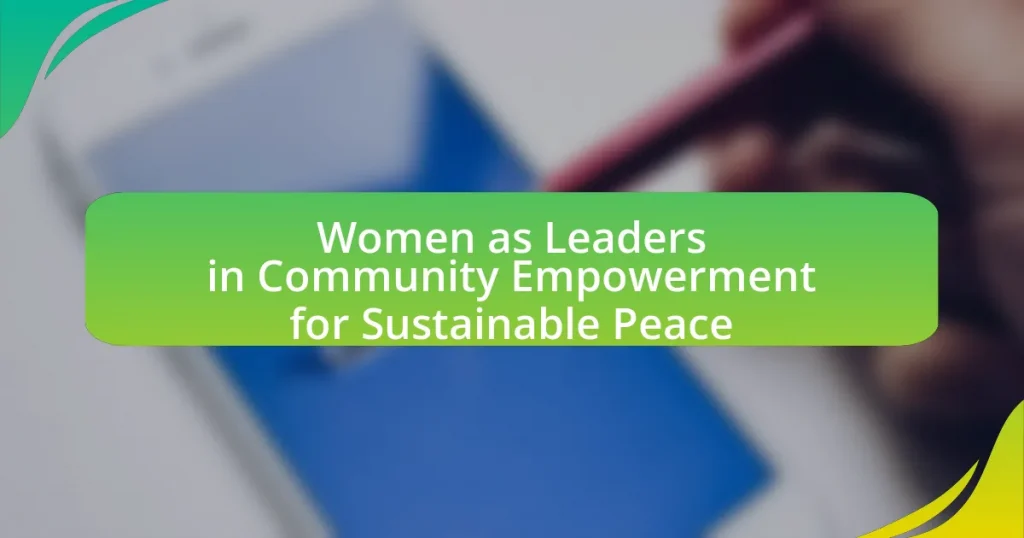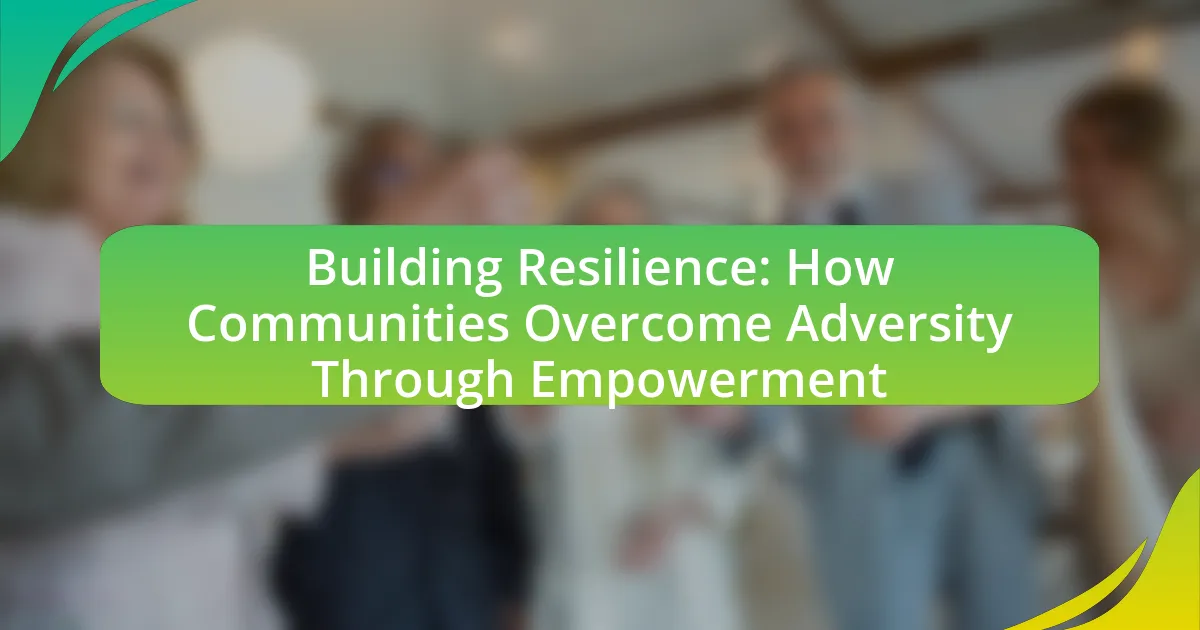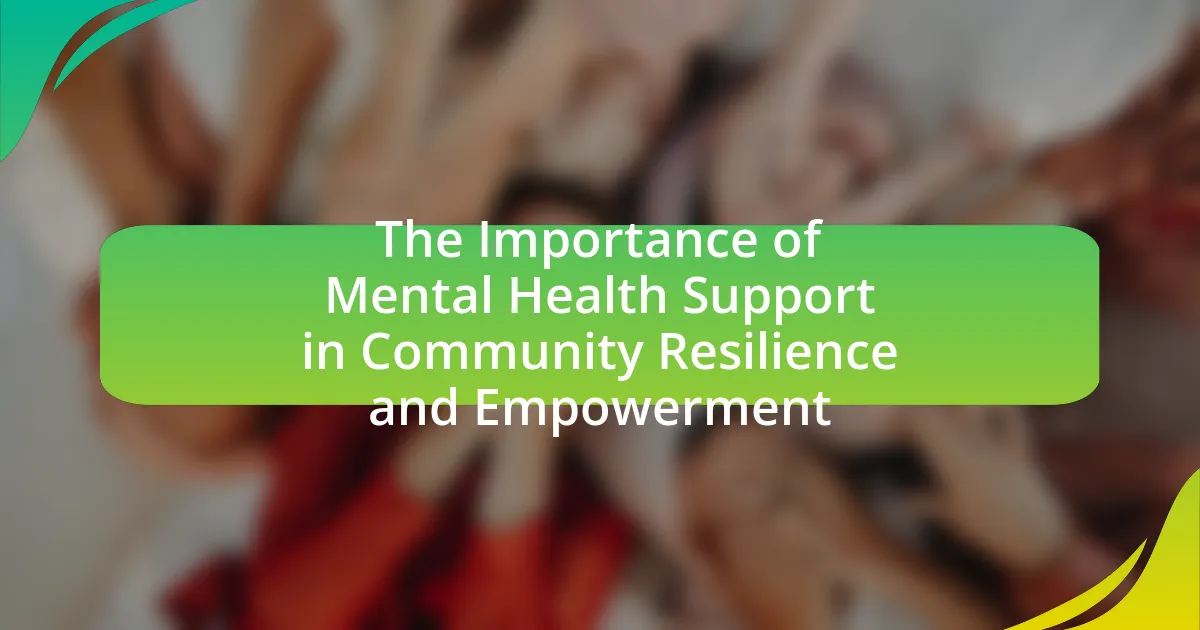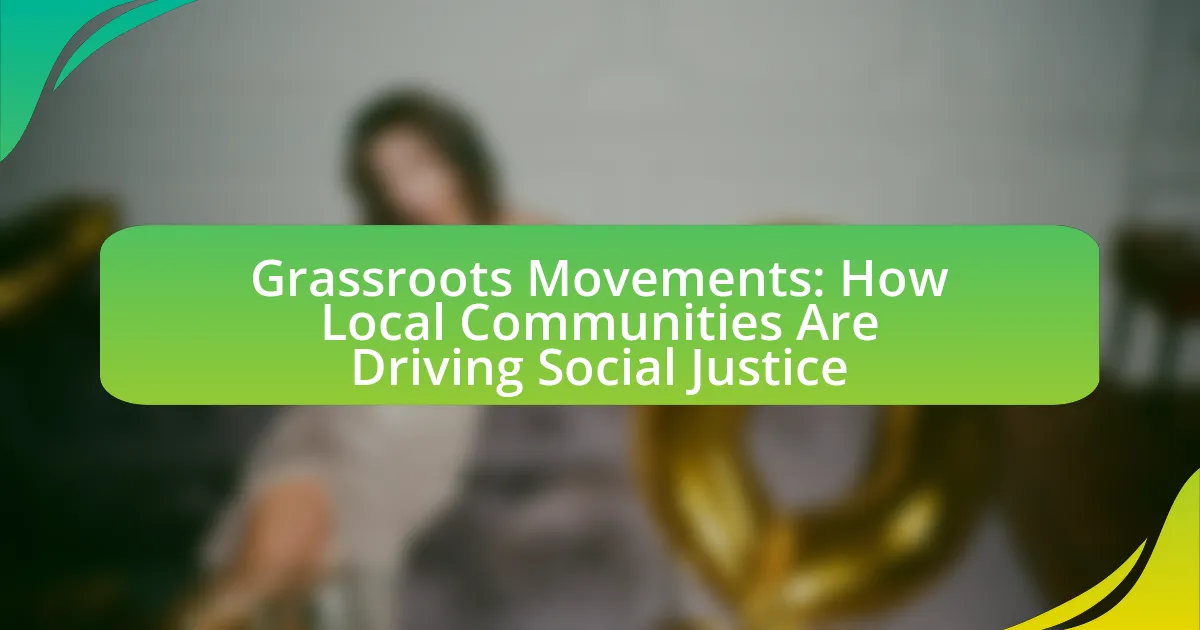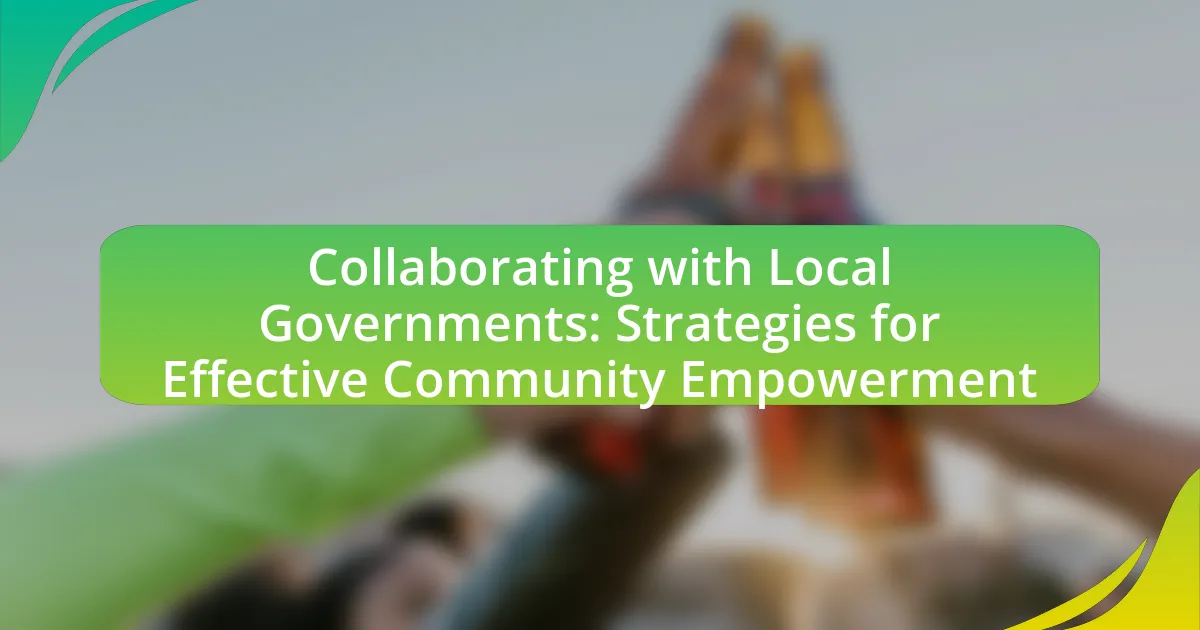The article focuses on the pivotal role of women as leaders in community empowerment for sustainable peace. It highlights how women’s leadership fosters inclusive dialogue, promotes social cohesion, and enhances grassroots initiatives, significantly increasing the likelihood of lasting peace. Key aspects discussed include the unique leadership qualities women bring, their influence on community dynamics, and historical examples of women’s impact on peacebuilding. The article also addresses the challenges women face in leadership roles, the importance of mentorship and education, and strategies for communities to support women’s empowerment efforts. Overall, it underscores the necessity of women’s involvement in peace processes for achieving sustainable outcomes.
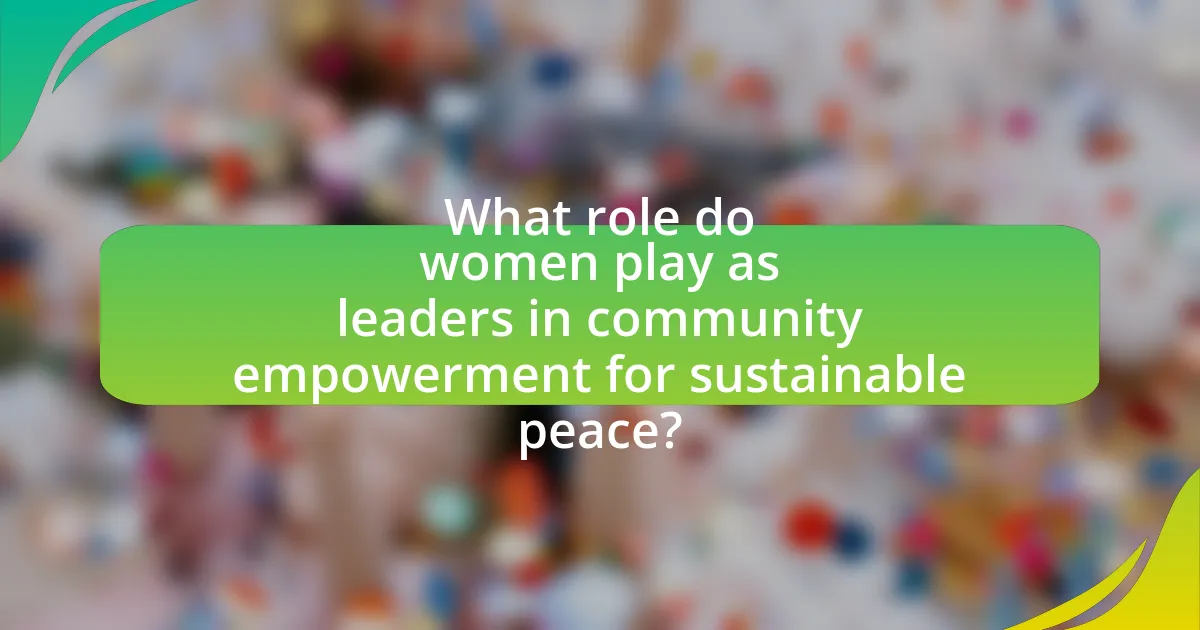
What role do women play as leaders in community empowerment for sustainable peace?
Women play a crucial role as leaders in community empowerment for sustainable peace by fostering inclusive dialogue, promoting social cohesion, and driving grassroots initiatives. Their leadership often leads to the establishment of peacebuilding frameworks that prioritize community needs and perspectives. Research indicates that when women are involved in peace processes, the likelihood of lasting peace increases by 20%, as evidenced by the UN’s 2015 report on Women, Peace, and Security. Women leaders mobilize resources, advocate for marginalized voices, and create networks that enhance community resilience, thereby contributing significantly to sustainable peace efforts.
How do women leaders influence community dynamics?
Women leaders influence community dynamics by fostering inclusive decision-making and promoting social cohesion. Their leadership often emphasizes collaboration and empathy, which can lead to more equitable resource distribution and enhanced community engagement. Research indicates that communities led by women tend to exhibit lower levels of violence and higher levels of trust among members, as seen in studies conducted by the United Nations Development Programme, which highlight the positive correlation between women’s leadership and community stability.
What specific leadership qualities do women bring to community empowerment?
Women bring collaborative leadership, empathy, and resilience to community empowerment. Collaborative leadership allows women to foster inclusive decision-making processes, ensuring diverse voices are heard and valued. Empathy enables women leaders to understand and address the unique needs of community members, creating a supportive environment that encourages participation. Resilience helps women navigate challenges and setbacks, inspiring others to persevere in the face of adversity. Research by the World Economic Forum indicates that women in leadership roles contribute to more sustainable and equitable community outcomes, highlighting the effectiveness of these qualities in driving positive change.
How do women’s leadership styles differ from men’s in community settings?
Women’s leadership styles in community settings often emphasize collaboration and inclusivity, contrasting with men’s styles that may prioritize assertiveness and hierarchical structures. Research indicates that women leaders are more likely to engage in participatory decision-making, fostering a sense of community and shared responsibility. For instance, a study published in the Journal of Leadership Studies found that women leaders are perceived as more empathetic and supportive, which enhances group cohesion and encourages diverse input. This collaborative approach can lead to more sustainable outcomes in community empowerment initiatives, as it aligns with the values of collective action and social harmony essential for sustainable peace.
Why is women’s leadership crucial for sustainable peace?
Women’s leadership is crucial for sustainable peace because it fosters inclusive decision-making and addresses the root causes of conflict. Research indicates that when women participate in peace processes, the likelihood of reaching an agreement increases by 35% and the durability of peace agreements improves significantly. For instance, a study by the United Nations found that peace agreements are 64% more likely to last at least 15 years when women are involved in the negotiation process. This involvement leads to more comprehensive solutions that consider diverse perspectives, ultimately contributing to long-term stability and resilience in communities.
What historical examples illustrate women’s impact on peacebuilding?
Women’s impact on peacebuilding is exemplified by the roles played by women in the Liberian civil war and the Northern Ireland peace process. In Liberia, women organized the Women of Liberia Mass Action for Peace, leading protests that contributed to the end of the civil war in 2003. Their efforts were recognized when Leymah Gbowee, a leader of the movement, received the Nobel Peace Prize in 2011 for her role in advocating for peace. In Northern Ireland, women from various communities participated in the Women’s Coalition, which played a crucial role in the peace negotiations that led to the Good Friday Agreement in 1998. This coalition emphasized the importance of including women’s perspectives in the peace process, demonstrating that women’s involvement can lead to more comprehensive and sustainable peace agreements.
How do women leaders address the root causes of conflict in communities?
Women leaders address the root causes of conflict in communities by promoting inclusive dialogue and fostering collaboration among diverse groups. They often implement community-based initiatives that prioritize education, economic empowerment, and social justice, which are essential for addressing underlying grievances. For instance, research by the United Nations indicates that women’s participation in peace processes increases the likelihood of sustainable peace by 35%. Additionally, women leaders frequently utilize grassroots networks to mobilize support and create platforms for marginalized voices, thereby reducing tensions and building trust within communities.
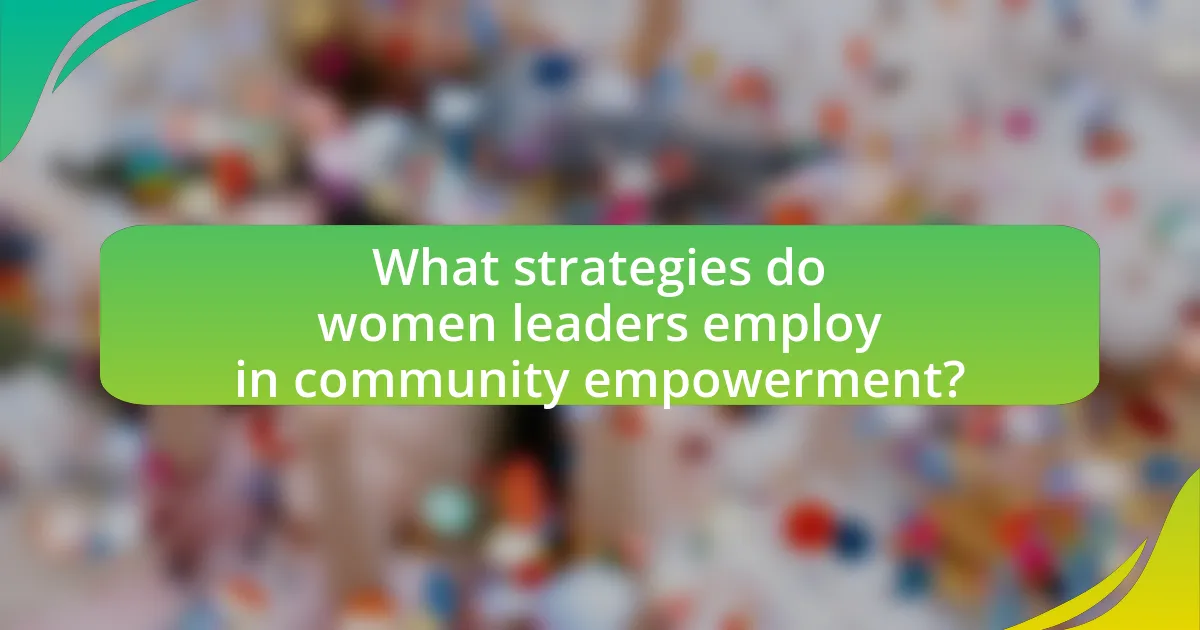
What strategies do women leaders employ in community empowerment?
Women leaders employ strategies such as fostering collaboration, advocating for inclusive policies, and promoting education to empower communities. By building partnerships with local organizations and stakeholders, women leaders create networks that enhance resource sharing and collective action. They also push for policies that address gender equality and social justice, ensuring that marginalized voices are heard in decision-making processes. Furthermore, women leaders emphasize education and skill development, which equips community members with the tools necessary for economic independence and active participation in civic life. These strategies are supported by research indicating that women’s leadership significantly contributes to sustainable community development and peacebuilding initiatives.
How do women leaders mobilize community resources for empowerment?
Women leaders mobilize community resources for empowerment by leveraging their networks, fostering collaboration, and advocating for inclusive policies. They identify local needs and resources, engage community members in dialogue, and create partnerships with organizations to pool resources effectively. For instance, studies show that women-led initiatives often result in increased funding and support for community projects, as seen in the work of organizations like Women for Women International, which empowers women in conflict-affected areas by providing them with skills and resources to improve their livelihoods. This approach not only enhances community resilience but also promotes sustainable peace by ensuring that diverse voices are included in decision-making processes.
What types of programs do women leaders implement to foster empowerment?
Women leaders implement various programs to foster empowerment, including mentorship initiatives, skill development workshops, and community engagement projects. Mentorship initiatives connect emerging female leaders with experienced mentors, facilitating knowledge transfer and confidence building. Skill development workshops focus on enhancing competencies in areas such as leadership, negotiation, and financial literacy, which are crucial for personal and professional growth. Community engagement projects encourage women to participate in local governance and decision-making processes, thereby amplifying their voices and influence in societal matters. These programs have been shown to increase women’s participation in leadership roles, contributing to sustainable peace and community development.
How do women leaders engage men and boys in community initiatives?
Women leaders engage men and boys in community initiatives by fostering inclusive dialogue and collaboration. They create platforms for men and boys to participate actively in discussions about gender equality and community development, emphasizing shared responsibilities. Research indicates that initiatives led by women that include men and boys result in increased community cohesion and support for gender equity, as seen in programs like the MenEngage Alliance, which promotes positive masculinities and engages men as allies in gender equality efforts.
What challenges do women face in leadership roles within communities?
Women face significant challenges in leadership roles within communities, including gender bias, lack of representation, and limited access to resources. Gender bias manifests in stereotypes that question women’s capabilities, often leading to fewer opportunities for leadership positions. According to a 2021 report by McKinsey & Company, women hold only 28% of senior leadership roles globally, indicating a stark underrepresentation. Additionally, women often encounter barriers in networking and mentorship, which are crucial for career advancement. A study published in the Journal of Community Psychology highlights that women leaders frequently struggle to secure funding and resources for community initiatives, further hindering their effectiveness. These challenges collectively impede women’s ability to lead and influence community empowerment efforts effectively.
How do cultural norms affect women’s leadership opportunities?
Cultural norms significantly limit women’s leadership opportunities by perpetuating stereotypes that associate leadership with masculinity. These norms often dictate that women should prioritize family roles over professional ambitions, leading to fewer women in leadership positions. For instance, a study by Catalyst found that women hold only 29% of senior management roles globally, reflecting the impact of societal expectations on women’s career advancement. Additionally, cultural beliefs may discourage women from pursuing leadership roles due to fears of backlash or social stigma, further entrenching gender disparities in leadership.
What barriers exist for women in accessing leadership training and resources?
Barriers for women in accessing leadership training and resources include systemic discrimination, lack of mentorship, and financial constraints. Systemic discrimination manifests in workplace cultures that undervalue women’s contributions, limiting their opportunities for advancement. The absence of mentorship programs further exacerbates this issue, as women often lack access to networks that facilitate leadership development. Financial constraints also play a significant role; research indicates that women are less likely to receive funding for training compared to their male counterparts, which restricts their ability to participate in leadership programs. These barriers collectively hinder women’s progress in leadership roles, impacting their potential to contribute to community empowerment and sustainable peace.
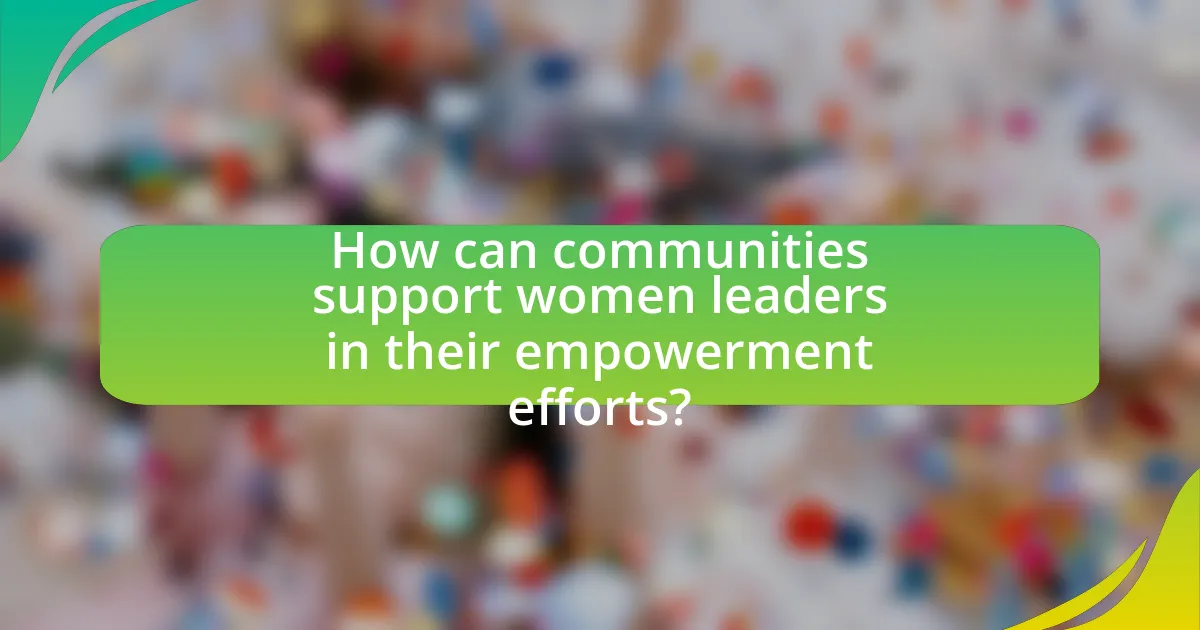
How can communities support women leaders in their empowerment efforts?
Communities can support women leaders in their empowerment efforts by creating inclusive platforms for dialogue and decision-making. These platforms enable women to voice their opinions and contribute to community initiatives, fostering a sense of belonging and leadership. Research indicates that when women participate in leadership roles, communities experience enhanced social cohesion and improved outcomes in areas such as education and health. For instance, a study by the World Bank found that increasing women’s participation in leadership positions can lead to a 20% increase in community development projects. By prioritizing mentorship programs and providing access to resources, communities can further enhance the capabilities of women leaders, ensuring their empowerment efforts are effective and sustainable.
What policies can be implemented to promote women’s leadership?
Policies that can be implemented to promote women’s leadership include establishing mentorship programs, enforcing gender quotas in leadership positions, and providing leadership training specifically for women. Mentorship programs connect aspiring female leaders with experienced mentors, facilitating knowledge transfer and support. Gender quotas, as seen in countries like Rwanda, have significantly increased women’s representation in government, demonstrating their effectiveness. Leadership training programs equip women with essential skills and confidence, fostering a pipeline of capable leaders. These policies collectively create an environment conducive to women’s leadership, contributing to community empowerment and sustainable peace.
How can community organizations create supportive networks for women leaders?
Community organizations can create supportive networks for women leaders by establishing mentorship programs that connect experienced leaders with emerging women leaders. These programs facilitate knowledge sharing, skill development, and confidence building, which are essential for leadership growth. Research indicates that mentorship significantly enhances women’s leadership capabilities, as evidenced by a study published in the Journal of Leadership Studies, which found that women with mentors are more likely to advance in their careers and take on leadership roles. Additionally, community organizations can host networking events that promote collaboration among women leaders, fostering a sense of community and shared purpose. By providing resources such as training workshops and access to funding opportunities, organizations can further empower women leaders to succeed and make impactful contributions to their communities.
What best practices can enhance the effectiveness of women leaders in community empowerment?
Best practices that can enhance the effectiveness of women leaders in community empowerment include fostering inclusive decision-making processes, building strong networks, and promoting mentorship programs. Inclusive decision-making allows women leaders to engage diverse community voices, ensuring that initiatives reflect the needs of all stakeholders. Research by the World Economic Forum indicates that organizations with diverse leadership teams are 15% more likely to outperform their peers, highlighting the value of varied perspectives. Building strong networks enables women leaders to share resources, knowledge, and support, which is crucial for effective community mobilization. Additionally, mentorship programs can empower emerging female leaders by providing guidance and fostering confidence, as evidenced by a study from the Harvard Business Review, which found that women with mentors are more likely to advance in their careers. These practices collectively enhance the capacity of women leaders to drive meaningful change in their communities.
How can mentorship programs benefit aspiring women leaders?
Mentorship programs can significantly benefit aspiring women leaders by providing guidance, support, and networking opportunities essential for their professional growth. These programs facilitate access to experienced mentors who can share valuable insights, strategies, and resources that help women navigate challenges in leadership roles. Research indicates that women with mentors are more likely to advance in their careers, as they receive personalized advice and encouragement, which enhances their confidence and decision-making skills. For instance, a study published in the Journal of Business and Psychology found that mentorship positively impacts career advancement and job satisfaction among women, highlighting the importance of such programs in fostering female leadership in various sectors.
What role does education play in empowering women for leadership?
Education plays a crucial role in empowering women for leadership by equipping them with the knowledge, skills, and confidence necessary to take on leadership roles. Access to education enables women to develop critical thinking, communication, and problem-solving abilities, which are essential for effective leadership. According to UNESCO, educated women are more likely to participate in decision-making processes and advocate for their communities, leading to improved social and economic outcomes. Furthermore, research from the World Bank indicates that increasing women’s education levels can significantly enhance their leadership potential, as educated women are more likely to hold leadership positions in both public and private sectors.
